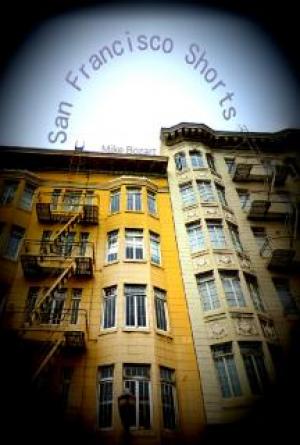XIX
HOPE
WET or fine, hot or cold, nothing was more certain than that the lame man would pass, leaning on his twisted oaken stick, his wicker basket slung on his shoulder. In that basket, covered by a bit of sacking, was groundsel, and rarely, in the season, a few mushrooms kept carefully apart in a piece of newspaper.
His blunt, wholesome, weather-beaten face with its full brown beard, now going grey, was lined and sad because his leg continually gave him pain. That leg had shrivelled through an accident, and being now two inches shorter than it should have been, did little save remind him of mortality. He had a respectable, though not an affluent, appearance, for his old blue overcoat, his trousers, waistcoat, hat, were ragged from long use and stained by weather. He had been a deep-sea fisherman before his accident, but now he made his living by standing on the pavement at a certain spot, in Bayswater, from ten o’clock to seven in the evening. And any one who wished to give her bird a luxury would stop before his basket, and buy a pennyworth of groundsel.
Often—as he said—he had “a job to get it,” rising at five o’clock, and going out of London by an early tram to the happy hunting grounds of those who live on the appetites of caged canaries. Here, dragging his injured limb with difficulty through ground that the heavens seldom troubled to keep dry for him, he would stoop and toilfully amass the small green plant with its close yellow-centred heads, though often—as he mentioned—“there don’t seem no life like in the stuff, the frosts ha’ spiled it!” Having collected all that Fate permitted him, he would take the tram back home, and start out for his day’s adventure.
Now and again, when things had not gone well, his figure would be seen stumping home through darkness as late as nine or ten o’clock at night. On such occasions his grey-blue eyes, which had never quite lost their look of gazing through sea-mists, would reflect the bottom of his soul, where the very bird of weariness lay with its clipped wings, for ever trying to regain the air.
In fact—as he had no need to tell you—he was a “trier” from year’s end to year’s end, but he had no illusions concerning his profession—there was “nothing in it”; though it was better on the whole than flowers, where there was less than nothing. And, after all, having got accustomed to the struggles of that bird of weariness within his soul, he would even perhaps have missed it, had it at last succeeded in rising from the ground and taking flight.
“An ’ard life!” he had been heard to say when groundsel was scarce, customers scarcer, and the damp had struck up into his shrivelled leg. This, stated as a matter of fact, was the extent of his general complaint, though he would not unwillingly descant on the failings of his groundsel, his customers, and leg, to the few who could appreciate such things. But, as a rule, he stood or sat, silent, watching the world go by, as in old days he had watched the waves drift against his anchored fishing-smack; and the look of those blurred-blue, far-gazing eyes of his, in their extraordinary patience, was like a constant declaration of the simple and unconscious creed of man: “I hold on till I drop.”
What he thought about while he stood there it was difficult to say—possibly of old days round the Goodwins, of the yellow buttons of his groundsel that refused to open properly, of his leg, and dogs that would come sniffing at his basket and showing their contempt, of his wife’s gouty rheumatism, and herrings for his tea, of his arrears of rent, of how few people seemed to want his groundsel, and once more of his leg.
Practically no one stopped to look at him, unless she wanted a pennyworth of groundsel for her pale bird. And when they did look at him they saw—nothing symbolic—simply a brown-bearded man, with deep furrows in his face, and a lame leg, whose groundsel was often of a quality that they did not dare to offer their canaries. They would tell him so, adding that the weather was cold; to which, knowing a little more about it than themselves, he would reply: “Yes, m’m—you wouldn’t believe how I feel it in my leg.” In this remark he was extremely accurate, but they would look away, and pass on rather hastily, doubting whether a man should mention a lame leg—it looked too much as if he wanted to make something out of it. In truth he had the delicacy of a deep-sea fisherman, but he had owned his leg so long that it had got on his nerves; it was too intimate a part of all his life, and speak of it he must. And sometimes, but generally on warm and genial days, when his groundsel was properly in bloom and he had less need of adventitious help, his customers would let their feelings get the better of them and give him pennies, when ha’pennies would have been enough. This, unconsciously, had served to strengthen his habit of alluding to his leg.
He had, of course, no holidays, but occasionally he was absent from his stand. This was when his leg, feeling that he was taking it too much as a matter of course, became what he would call “a mass o’ pain.” Such occasions threw him behindhand with his rent; but, as he said: “If you can’t get out, you can’t—can you?” After these vacations he would make special efforts, going far afield for groundsel, and remaining on his stand until he felt that if he did not get off it then, he never would.
Christmas was his festival, for at Christmas people were more indulgent to their birds, and his regular customers gave him sixpence. This was just as well, for, whether owing to high living, or merely to the cold, he was nearly always laid up about that time. After this annual bout of “brownchitis,” as he called it, his weather-beaten face looked strangely pale, his blue eyes seemed to have in them the mist of many watches—so might the drowned ghost of a deep-sea fisherman have looked; and his pale roughened hand would tremble, hovering over the groundsel that had so little bloom, trying to find something that a bird need not despise.
“You wouldn’t believe the job I had to find even this little lot,” he would say. “Sometimes I thought I’d leave me leg be’ind, I was that weak I couldn’ seem to drag it through the mud at all. An’ my wife, she’s got the gouty rheumatiz. You’ll think that I’m all trouble!” And, summoning God-knows-what spirit of hilarity, he smiled. Then, looking at the leg he had nearly left behind, he added somewhat boastfully: “You see, it’s got no strength in it at all—there’s not a bit o’ muscle left.... Very few people,” his eyes and voice seemed proudly saying, “have got a leg like this!”
To the dispassionate observer of his existence it was a little difficult to understand what attraction life could have for him; a little difficult to penetrate down through the blackness of his continual toil and pains, to the still living eyes of that bird of weariness, lying within his soul, moving always, if but slightly, its wounded stumps of wings. It seemed, on the whole, unreasonable of this man to cling to life, since he was without prospect of anything but what was worse in this life; and, in the matter of a life to come, would dubiously remark: “My wife’s always a-tellin’ me we can’t be no worse off where we’re a-goin’. An’ she’s right, no doubt, if so be as we’re goin’ anywhere!”
And yet, so far as could be seen, the thought: “Why do I continue living?” never came to him. It almost seemed as if it must be giving him a secret joy to measure himself against his troubles. And this was fortunate, for in a day’s march one could not come across a better omen for the future of mankind.
In the crowded highway, beside his basket, he stood, leaning on his twisted stick, with his tired, steadfast face—a ragged statue to the great, unconscious human virtue, the most hopeful and inspiring of all things on earth: Courage without Hope!
END.







